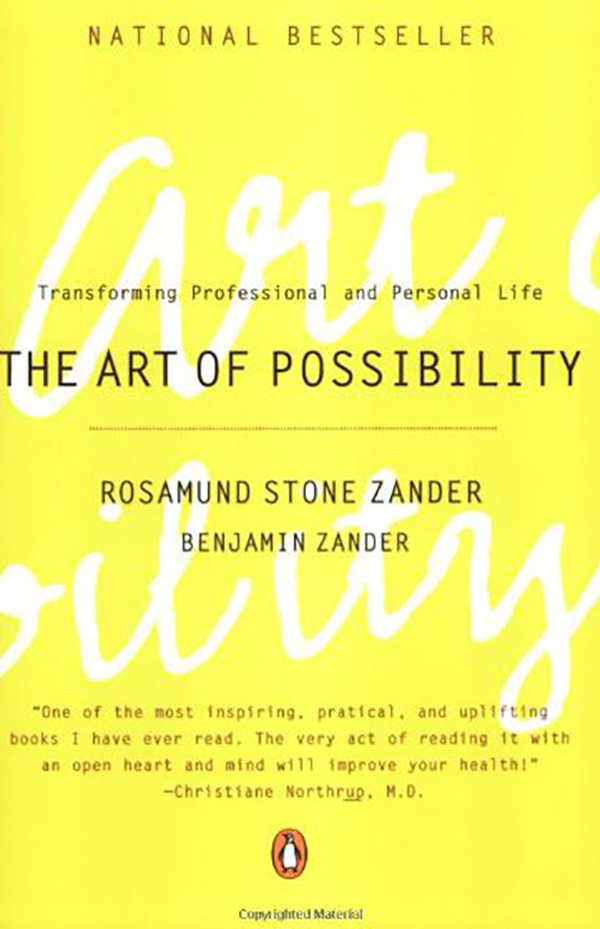The Book in Three Sentences
Everything in life is an invention. If you choose to look at your life in a new way, then suddenly your problems fade away. One of the best ways to do this is to focus on the possibilities surrounding you in any situation rather than slipping into the default mode of measuring and comparing your life to others.
The Art of Possibility summary
This is my book summary of The Art of Possibility by Rosamund Zander and Benjamin Zander. My notes are informal and often contain quotes from the book as well as my own thoughts. This summary also includes key lessons and important passages from the book.
- Everything in life is based on your reference frame. Look at things in a new way and suddenly your problems fade away.
- It’s all invented. Everything in life is an invention. The way we see things. The way we measure things. The way we compete. The way we judge ourselves.
- If it’s all invented, then you might as well invent a way of viewing life that benefits you. You might as well invent a frame of possibility.
- Give an A. If you automatically assume the best and give everyone an A in life, then you let the best come out in them and you remove a lot of the barriers that have been the relationship back.
- Nearly everyone lives in The Measurement World without realizing it. Everything we do is based on measurement in our lives. How much money we make. Whether our team wins. How beautiful our spouse is. Everything is based around some form of measurement.
- You don’t need to play the measurement game. You can play the possibility game. You can live in The Possibility World.
- Instead of focusing on how you measure up, focus on how you contribute to the world around you. Contribution is not measured based on other people. It’s only measured based on what you put into the world around you. That’s it. If you add something, you contributed.
- Assignment for yourself: write down all the ways in which you have been a contribution to the world around you in the last week. There is no space for your failures or missteps. You only get to list how you contributed in a positive way.
- A leader who feels he is superior is likely to suppress the visions of the very people he needs to rely on to succeed.
- The conductor can lead the most powerful orchestra in the world, but does not make a sound. His or her only power is in getting the players to produce the beautiful sound they are capable of.
- What would I say if I was suddenly called upon to lead?
- How much greatness do we expect of those around us? It matters.
- Rule #6: Don’t take yourself so damn seriously.
- If you are worried about making a mistake, imagine that a 500-pound cow will fall on your head.
- The Calculating Self is who runs our lives in The Measurement World. The Central Self is who runs our lives in The Possibility World.
- What would have to change to make this possible?
- Redraw the box in your mind to create a reference frame that embraces the way things actually are and allows you to see them in a new way.
- Zander’s music professor to him when he struggled to learn a new piece quickly: “You mean, you’ve been playing for THREE MINUTES and you STILL haven’t mastered it?”
- Be with the way things are. We have to distinguish our thoughts and feelings about the events from how the events actually are. We often let our feelings about how things should be prevent us from being with the moment and taking appropriate action. We get so wrapped up in things not being as we wish they would that we prevent ourselves from moving forward.
- Separate our conclusions about events from our descriptions of the events themselves.
- The more attention you shine on a subject, the more evidence of it you find. This is how downward spiral talk escalates into a reality.
- People who describe the glass as half full are not delusional optimists. In fact, they are more based in reality because they are describing a substance that is actually in the glass. They are describing reality as it is. The cynic who describes the glass as half empty is focusing their energy on something that is not actually there.
- It is the framework of scarcity — the belief that it exists — that causes divisions between people, not actual scarcity.
- Don't focus on being the best in the world. Focus on being the best FOR the world.
- When you break a bone, you don't blame it on the leg or the arm. It is a problem of the entire body. What if we acted that way in society? Instead of blaming groups for violence or terrorism, we see it as a problem for all of society, something we all have a responsibility to solve.
- The Truth and Reconciliation Project in South Africa united people who had been on opposing sides during Apartheid. It was through connection of enemies, not revenge, that the country found healing.
